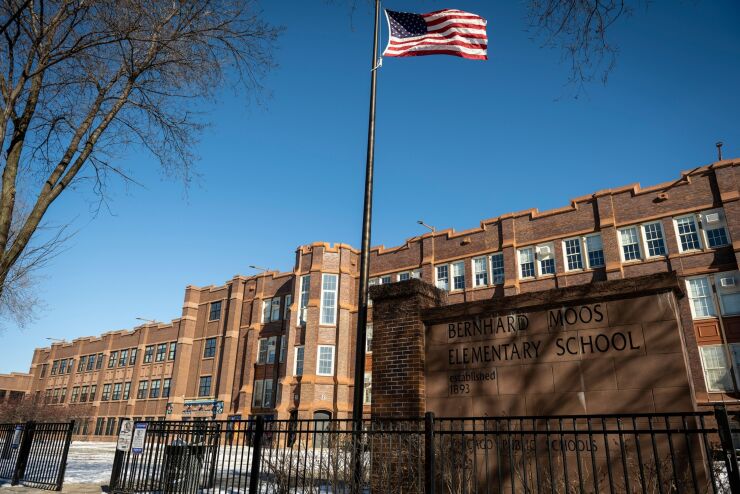Chicago Public Schools'
The Chicago Board of Education signed off on the
The vote followed warnings from district officials and board members about a $600 million to $700 million budget gap expected in fiscal 2026 after all of the district's $2.8 billion of federal pandemic relief is exhausted, threatening the district's progress toward

While district finance officials said they are confident they can balance the fiscal 2025 budget, other pressures could make that task more difficult including inflation, property tax and other tax collections, pension obligations, and labor contracts.
"Many districts around the country right now are pressured to cut" staff and close schools, said Chief Executive Officer Pedro Martinez.
"I do feel it is a warning for us," he said.
"We are laying it all out there" for the public to understand, said board Chairman Miguel del Valle, adding that the need to use state aid to repay debt and pensions puts the district in "a bind" and "has to change."
"If it hadn't been for the federal dollars…we'd be in even worse shape than we are," del Valle said.
District officials noted that despite increased help from the state over the last six years, the state covers only one-third of teacher pension, and direct school aid still falls $1.4 billion short of evidence-based state goals despite annual state increases.
The district also must use about $500 million of state aid to help pay off bonds because its levy is capped by state law and it has few other revenue-raising options.
Del Valle announced he is stepping down at the end of his term Friday, giving new Mayor Brandon Johnson his first opportunity to begin shaping the board. Now comprised of mayoral appointees, the Board of Education will shift to a partially elected board in 2025 and then fully elected panel in 2027.
While Johnson, a former Chicago Teachers Union organizer, and the district are allied in pursuing more funding from the state, it could be tough going given that the state raised funding in 2017 with a shift toward an evidence-based funding formula. The state also began covering a portion of CPS teachers' pension although it falls short of what other districts receive.
The district's bond ratings landed in junk territory between 2015 and 2016 as its deficit grew and it turned to one-shots like reserve use and debt restructuring.
Hikes in state funding and local levies to aid with capital and teachers' pension helped turn the corner although rising expenses were again threatening the district as the pandemic hit.
Absent more state aid, the district could seek the ability to further raise its tax levy. Other districts with elected boards have the ability to go to voters to raise the levy for capital and operations.
Johnson would face a backlash if he seeks that option given his campaign pledge to hold property taxes in check.
While threats loom once the federal COVID funding is exhausted, the district's current fiscal state remains on the upswing.
The district's finance team expects to close out a second consecutive fiscal year without any tax anticipation notes outstanding and a positive cash balance while its reserves are projected to reach a target of 15% of total operating and debt service budget, – or $1.2 billion, in the next fiscal year, up from $1 billion this year and $800 million in 2022.
TAN borrowing, which smooths cash flow needs as the district awaits property tax disbursements, did rise this year to $1.15 billion after being cut in recent years to $800 million but that was due to Cook County delays in sending out bills. CPS has budgeted $19.5 million for interest on anticipated TAN borrowing in the next budget.
While calling the 2024 budget "stable,"
"The Civic Federation notes some positive aspects of CPS' financial standing, including a recent S&P credit rating upgrade, increases in state funding to CPS, the district's growing general operating reserves and a property tax levy that is dedicated to funding pensions," the federation said in its review of the budget.
But pressures abound from rising pension costs, declining enrollment, an ongoing reliance on TAN borrowing, and "further complicating matters, the timing of the massive revenue shortfall coincides with the arrival of the district's new partially elected school board, set to take office beginning in 2025."
CPS pensions carry a $13.8 billion unfunded liability. A $1 billion payment is owed in fiscal 2024 with the state and a local pension levy covering all but $143 million which will fall on the district to pay.
"Now is the time for Chicago Public Schools to make a long-term fiscal plan," the federation's acting president, Sarah Wetmore, said in statement. "The district must work to establish financial stability by improving efficiency wherever possible and by making efforts to cut costs, in addition to any requests that are made to the state for greater support."
The district's ratings have risen but remain mostly speculative grade.
Kroll Bond Rating Agency is the exception, rating CPS GOs either BBB or BBB-plus, depending on the series.
Moody's Investors Service rates the GOs Ba2 with a positive outlook. Fitch Ratings and S&P Global Ratings rate the bonds BB-plus with stable outlooks. S&P raised the rating one notch earlier this year.
The district has $8.9 billion of outstanding long-term debt, most in GO form, with $1.4 billion backed by a capital improvement tax.
The CIT bonds carry ratings of BBB-plus from Kroll and A from Fitch, with stable outlooks. The district





